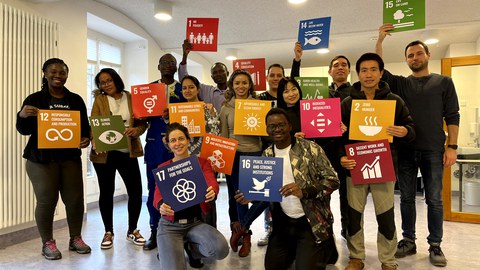peace & partnership
SDG 16 "Peace, Justice and Strong Institutions" - Refugee Law Clinic
Tara Kusche, Charlotte Staron, Mette Steffen from the Refugee Law Clinic are supporters of SDG 16:
What word would you use to describe this project that focuses on SDG 16?
The Refugee Law Clinic Dresden can best be described with the word “justice.” This term is also a subgoal of SDG 16: It is about promoting the rule of law and access to justice. This is exactly where we at the RLC come in.
What is the project about and how does it relate to SDG 16?
We are a student-run, non-partisan initiative at TU Dresden, which offers a free consultation service on asylum and residence law. With this, we hope to close the gap in our legal system. Refugees also need to understand and be able to assert their rights. By closing the gap in the rule of law, we promote democracy and help lay the foundation for sustainable development.
RLC Dresden was founded at the end of 2015, when the German authorities and lawyers reached their capacity with the influx of refugees from Syria and Iraq. These people nevertheless require legal access and help in understanding their individual rights, without being discriminated against. For this purpose, we offer free legal counseling for students. Detailed information about our current counseling hours - online and in person at various locations in Dresden - can be found on our website. https://tu-dresden.de/zis/kooperation/refugee-law-clinic-dresden/beratung.
Today, the RLC is located at the Center for Integration Studies and the Center for International Studies of TU Dresden. The initiative has also received support from the non-profit organization since January 2020. You can also support the work of the RLC through donations or by becoming a member. https://www.rlc-dresden.de/.
In addition to our counseling services, we are also spread awareness and educate others on the topics of seeking refuge and migration.
The RLC gets students fit for this job each year by providing them with lectures, practical sessions and colloquia in the fields of asylum and residence law. All students of TUD can attend the lectures. These courses start in each the winter semester, and last for two semesters.
In the first semester, the basic of asylum and residence law are covered; the semester ends with a written exam. At the same time, you can shadow qualified counselors in the consultations at the RLC Dresden in order to directly combine theory with practice. Between semesters, they also complete an obligatory four-week internship at a court, advisory center, law firm or official authority.
In the summer semester, everything revolves around counseling practice: Guests to the organization hold presentations on important topics such as family reunification, securing residence status and detention pending deportation. This provides the trainees the specialized knowledge necessary to properly classify complex consultation cases. Once training is over and the oral exam is completed, voluntary consultation may begin.
Over the course of the year, we offer regular training for all counselors and course participants. With these regular professional development courses, counseling team members always stay up-to-date and enjoy many opportunities to consolidate their knowledge of the rights of asylum and residence.
If you are interested in our counseling, activities, or our courses, please let us know by sending an email to: . We would be delighted for you to become part of the RLC Dresden and help us to promote justice and the rule of law. https://instagram.com/rlc.dresden
SDG 17 "Global Partnership" - CIPSEM
Dr. Anna Görner, Course Director of Centre of International Postgraduate Studies of Environmental Managment (CIPSEM) is pate of SDG 17:
Sustainable Development Goal 17 is all about "partnerships for the goals". A successful sustainable development agenda requires partnerships between governments, the private sector and civil society. These inclusive partnerships, based on principles and values, a shared vision and common goals that put people and the planet first, are needed at the global, regional, national and local levels. The Center for International Postgraduate Studies of Environmental Management (CIPSEM) contributes to this. As an institution of the Faculty of Environmental Sciences of Technische Universität Dresden, CIPSEM is responsible for the implementation of the UNEP/UNESCO/BMUV International Postgraduate Program on Environmental Management for Developing Countries.
The overall goal of our course program is to contribute to a significant acceleration of the transformation process towards sustainable development in line with the 2030 Agenda, the Paris Climate Agreement and a true global partnership, as all states and actors share a common responsibility. The program also aims to strengthen Germany's bilateral environmental relations with developing countries and emerging economies in the long term, as all sides benefit from the exchange of information and experience. The program recognizes the importance of building connections for further international cooperation and acts as a networking platform by encouraging alumni to stay in touch with each other and with CIPSEM.
The course program and all its activities are financially supported by the German Federal Ministry for the Environment, Nature Conservation, Nuclear Safety and Consumer Protection (BMUV) via the German Environment Agency (UBA) and Technische Universität Dresden (TU Dresden). CIPSEM provides an excellent opportunity for environmental experts from the Global South working at the national, regional or local level to expand their networks, learn from each other and become more effective and recognized leaders, which is fully in line with, for example, subgoal 17.16, which focuses on multi-stakeholder partnerships to mobilize and share knowledge, expertise and technology to support the achievement of the SDGs in all countries, but especially in developing countries and emerging economies.


